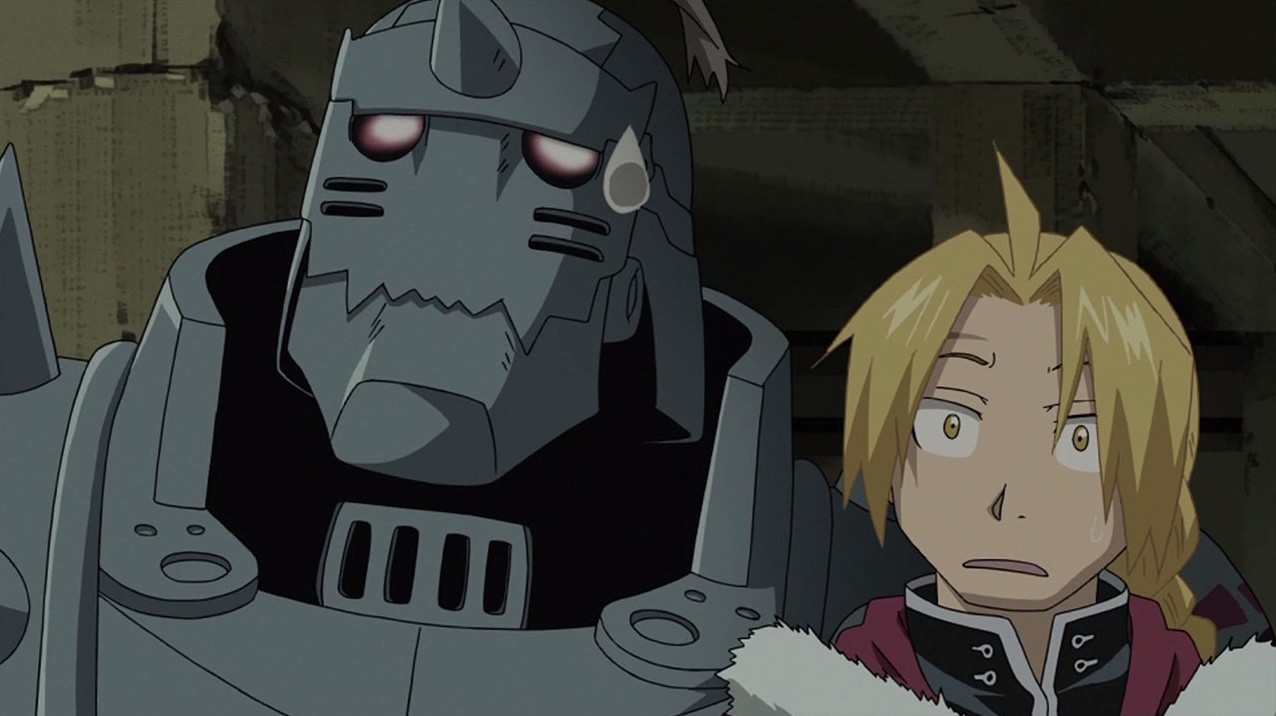
I?m not a huge anime connoisseur. But Full Metal Alchemist in its various incarnations gets so much hype, I had to give it a watch. And while the storyline is pretty good, and while it?s based on a fascinating concept, I found myself unable to make it all the way to the end.
I mean, just look at this:

Maybe it?s just me, but I can?t take a show seriously when it looks like this. And this is supposed to be a serious show. It?s probably one of the reasons I?m not a huge consumer of anime.
So I?m coming into this argument from the perspective of someone who hasn?t finished the show (neither FMA nor FMAB) and doesn?t know if these concepts are ever fully dealt with. I acknowledge that. But I?m digging in anyway.
Let?s talk about equivalent exchange.
?Humankind cannot gain anything without first giving something in return. To obtain, something of equal value must be lost. That is Alchemy?s First Law of Equivalent Exchange.?
Alright, let?s start establishing some rules here. Besides being a principal of equal trade, we know that human resurrections don?t work, although I believe they theoretically could under the right circumstances. But not only do these types of transmutations seem to always fail, they go absolutely nuts. When Ed and Al attempt to resurrect their mother, they end up resurrecting some nasty mess of body parts and lose Al?s entire body in the process. In order to avoid losing Al?s soul as well, Ed is able to successfully bind it to a suit of armor.
So let?s pick this occurrence apart a little bit. Ed sacrifices his arm in order to retain Al?s soul. So immediately we know there is a difference between using human souls in a transmutation before they have passed into the afterlife vs after. Whereas before passing on it seems to work just fine, after passing on it becomes virtually impossible.
We also know that the retention of Al?s soul was indeed an exchange because Ed has to sacrifice an arm in order to do it. With that in mind, we can look at this situation from one of two perspectives:
- Al?s soul was not an inherent component of the original resurrection exchange attempt but was simply going to be lost because his body was gone. From this perspective, the value of a non-departed human soul is exactly equal to one human arm because that was all that was exchanged in order to retain it.
- Or, Al?s soul was part of what would have been exchanged in the failed resurrection attempt as ?the world? attempted to collect things whose sum value would equal the value of what was being returned. In this case, because the soul was already part of an exchange, the successful sacrifice of Ed?s arm in order to retain it implies that the soul was actually worth less than Ed?s arm. This is because the arm was sufficient not only to retain the soul itself, but also for the failed resurrection to complete.
We?ll come back to this later.
Now let?s talk about value.
There is a particular debate going on in some strange corners of the Internet right now about the price of a human soul. Essentially, here?s what one theory says (some punctuation and spelling fixes added for clarity):
?It seems to be a matter of debate at the moment as to the value of a human soul as per FMA. Everyone wants to say that a human soul is priceless and that is why every human trans-mutation attempt fails. A Film Theory episode suggests that maybe it?s because their formula for how to make a human being was wrong and that this is why all attempts failed and people have rejected this because it goes against canon, etc.
?Let me ask this. Could a person exchange a soul for another soul? Could he/she sacrifice themselves to bring someone else back to life?
?If your answer is no because no two souls would be equal to each other, then this means that there must be some measurement/quantity/value to a human soul that would make one more valuable than the other. If your answer is yes, then that would mean that there IS a price to a human soul, and thus a human soul is NOT priceless but is, as far as we know, only equivalent to itself, but there IS a price for it and it might be obtainable in the future.?
When I read this I became much less interested in why human transmutation attempts fail and much more interested in the concept of pricelessness and how it applies to equivalent exchange.
I think the author of the above quote has it wrong when he says that the ability to exchange one soul for another implies that the soul is not priceless. Pricelessness, after all, is just another way to talk about infinity.
When numbers reach infinity, the normal rules start to break down. You can?t, for example, add 1 to infinity and then measure it to be any larger than it already was. You also can?t subtract 1 from infinity and measure it to be any smaller. People have posited that there can be infinities of different sizes, but that?s a theory that can never be put into practice. If you have, for example, the infinite set of all whole numbers placed next to the infinite set of all whole numbers and all the decimals between them, you will find that by every measurement, you can never actually measure one to be larger than the other. They will both always be of infinite size.
With that in mind, let?s imagine a priceless object, perhaps a human soul. If a human soul is priceless, then it is the very nature of that pricelessness that would allow you to exchange one soul for another. In other words, if the souls have infinite value, then you could never measure the value of one soul to be larger or smaller than another. And if they can never be measured as different in value, they must unavoidably be considered as being the same and therefore exchangeable.
And now we can start to cheat the system.
If infinities can never be measured as unequal in value, then there would be nothing stopping you from exchanging one priceless object for a thousand or a million, or even a billion priceless objects.
Think of it like this: if the value of a human soul is infinite, what is the value of two souls? Still infinite. Ten souls? Still infinite. Infinite souls? Still infinite. You can not measure a difference in value and therefore, you could theoretically sacrifice yourself in order to resurrect everyone else who has ever died ever.
But you will no doubt begin to find reasons why this logic doesn?t work. You may say, for example, that one infinity is inherently unequal to infinite infinities. Trading one soul for ten, for example, should still allow you to make a comparison between one and ten, in which case ten is larger. But if we continue down this path, all we do is introduce a new problem.
The new problem introduced is the definition of value, how that is assigned, and who assigns it. Does value refer to the amount of physical particles exchanged? Clearly that is the basis for alchemy in FMA. But consider this quote from Ed:
?Alchemy: the science of understanding the structure of matter, breaking it down, then reconstructing it as something else. It can even make gold from lead. But alchemy is a science so it must follow the natural laws: to create, something of equal value must be lost. This is the principal of equivalent exchange. But I learned that night that some things cannot be measured on a simple scale. My brother and I knew the laws of science, of equivalent exchange. The game required sacrifice, that something had to be taken from us, but we thought there was nothing more we could lose?.We were wrong.?
So FMA introduces two scales: the scientific, matter-for-matter scale; and the metaphysical concept of sacrifice that ?cannot be measured on a simple scale.?
Why Sacrifice Matters
If sacrifice plays into the equation, then we now have to admit that the sentimental value a person assigns to an object affects its total value in every exchange due to scientific law. FMA implies on multiple occasions that it is this particular kind of value that makes a departed human soul so nearly impossible to retrieve. And if that?s true, then it means sentimental value can vastly outweigh the material value of an object.
With this in mind, let?s think about pennies. If I have a single penny, I should be able to transmute that penny into a more ambiguously shaped blob of copper. (Of course, we?ll completely disregard the fact that, in reality, all that explosive light and energy released upon transmutation can only be the result of some matter being converted to energy and then lost in the transfer, thus breaking the equivalency rule in other ways.)
But now let?s say this penny was given to me by my father on the day he died, that it had been handed down from father to son in my family for generations, and that, on top of this, society as a whole ascribes monetary value to it as long as it is in the shape of a penny. As soon as I transmute that penny into a blob of copper, I?m sacrificing a good bit of metaphysical value for absolutely nothing in return but a blob of copper of equivalent size. If the universe doesn?t compensate me for that, then Ed and Al shouldn?t have to compensate the universe for gained sentimental value if they attempt to resurrect their mother. It should just be matter for matter.
You may be inclined to respond that somehow the universe would compensate me. Maybe the blob of copper is larger than the original penny. I would, of course, respond by asking you how exactly sentimentality can be measured against matter. But even better, I?d take you down the road of considering the idea of an object that carries a particular sentimentality value for one person, but a completely different value for another person.
Another Way to Cheat the System
Suppose I don?t care at all about quartz but I have a friend who is obsessed with collecting it. Because I ascribe no sentimentality to quartz, I should be able to transmute a normal rock into a block of quartz and then simply give it to my friend. In this case, I stand in as a proxy for my friend to do the exchange and can thereby bypass the sentimentality measure inherent in the exchange. And if this is possible, then any alchemist ought to be able to resurrect the soul of any person they don?t have a sentimental connection to.
But let?s assume the universe would prevent this. If so, it can only prevent it by ascribing an intrinsic, metaphysical value to every object rather than allowing a person?s own sentimentality to play a role in the exchange, or we would have to admit that equivalent exchanges could never take place due to the possibility that some day in the future some person might get their hands on a transmuted object that carries more sentimental value for them than it did for the person who transmuted it. If one of these two precautions isn?t taken by the universe, the system is easily cheated.
So if the universe won?t let us cheat the system by performing a transmutation on behalf of another person, then the human resurrection problem must be caused by the universe ascribing a higher-than-average value to human souls, not because a person ascribes sentimental value to the person being resurrected.
Retracing Steps
Let?s get back to our thought experiment involving infinities. We?re now in a place where we have to assume that the universe does not care about our own sentimentality, but just ascribes a metaphysical value to certain objects. We?re also assuming that the value ascribed to a human soul is infinite, otherwise it can be traded using matter for matter.
If the universe doesn?t care about our own sentimentality then there is no reason for it to calculate that trading ten souls for one is an unequal trade. If the universe only has its own value assignment to go by then the metaphysical value of ten infinitely valued items is the same as one. Any difference in material exchange can easily be made up for.
So if equivalent exchange exists, we ought to be able to cheat it. If our own sentimentality matters in terms of value, we can have someone else do the exchange for us. If it doesn?t, we can trade a single priceless item for infinite priceless items. And that?s why it doesn?t work.
Further Questions
One potential avenue we haven?t explored is the possibility that the value of a soul isn?t actually priceless but is simply extremely high. This would theoretically stop us from trading one item for many, but it would also leave the impossible-to-answer question of what determines that value so arbitrarily.
Also, let?s get back to Ed?s arm vs. Al?s soul. In light of everything we know about equivalent exchange, how in the world was Ed able to exchange his arm for a soul? The fact that this happened implies that the value of a soul is not in fact priceless but is instead pretty easily measured in material costs. Or it could mean that, in reality, transmutation of a soul is just as easy and normal as anything else and that the only real problem is that you can?t get one back after it?s passed through the Gate.
Also, from the sentimentality perspective, we?d be forced to assume that Ed cared equally about his brother and his arm. But if that were true, why would he have been incentivized to trade one for the other? And even if he were, the simple act that he performed the exchange ought to be an indicator that he cared more about Al than his arm, thus lending further evidence to the idea that sentimentality can not be taken into account because it would have made that exchange unequal, or to the idea that a soul is actually worth less than an arm before it has fully departed into the afterlife.
A soul might, under the right philosophies, have some material value and that value might be considered to be less than a dense, heavy, human arm. But if so, then whatever metaphysical value the universe ascribes to it can only be large enough to make up the difference.
Conclusions
FMA probably jumped the gun on the whole arm-for-a-soul thing. It seems to make it pretty difficult to nail down exactly what the rules of equivalent exchange actually are.
As I said before, if equivalent exchange exists, we should be able to cheat it, but canon insists that we can?t and I can?t find any good reason why not.
This makes me sad. So here?s what I think the real solution is:
Alchemical transmutation is the changing of an object from one form into another. Gold into lead, for example. If a human being is the combination of a material body and a soul, and if the real essence of the person is in the soul, then you would never be able to resurrect a person simply by converting one substance into another. You would need to retrieve the original soul in order to get back the original person. This, of course, has nothing to do with transmutation. You?d need to transmute materials into a physical body and then you?d need to bind the original soul to that body as Ed did with Al?s soul and the suit of armor. So I think the only real reason that resurrections don?t work is that it?s not a matter of transmutation at all and it just isn?t quite so easy to get access to a person?s original soul.
– Philo


